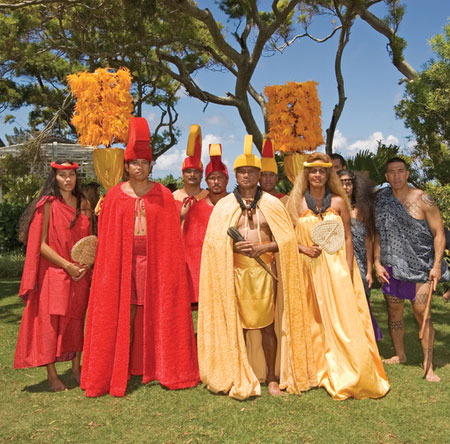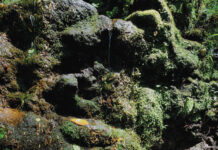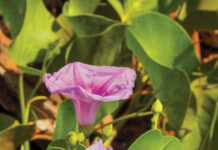Micheal Stein | Photography by Luana Pa‘ahana/Ka‘anapali Beach Hotel | Yuki Lee | Bishop Museum
I ke ao ‘eka ‘eka o Lono
Kukulu ka ipu ‘eka ‘eka o Lono
Ho mai ka ipu lau makani o Lono
Ia hiki mai ka ua o Lono
Ho‘oulu ke ea
Ho‘oulu ke kupu
Ho‘oulu ka wai nape i ke kama o Ho‘ohokulani
In the dark cloud of Lono
Lono’s water gourd takes form
Grant us Lono’s gourd of many winds
Let Lono’s rains come
Increase the life
Increase the plant growth
Increase life in man (child of Ho‘ohokulani)
—from a Makahiki chant by Nalani Kanaka‘ole
“For now, I’m a student of Makahiki, trying to become a professor.”
 Kimokeo Kapahulehua’s work on restoring Hawaiian fishponds has won him a Volunteer of the Year award from the National Marine Sanctuary Foundation, and he has been teaching Hawaiian traditions to the children of Maui for decades. His honest admission of gaps in his knowledge of Makahiki underscores how even some native Hawaiian activists and cultural practitioners are in the first stages of re-exploring one of the most sacred and vital of all Hawaiian festivals.
Kimokeo Kapahulehua’s work on restoring Hawaiian fishponds has won him a Volunteer of the Year award from the National Marine Sanctuary Foundation, and he has been teaching Hawaiian traditions to the children of Maui for decades. His honest admission of gaps in his knowledge of Makahiki underscores how even some native Hawaiian activists and cultural practitioners are in the first stages of re-exploring one of the most sacred and vital of all Hawaiian festivals.
In ancient times, Makahiki was not just a holiday, but a whole season in which to celebrate the god Lono, who provided peace and the fruits of the harvest. Now, after centuries when such festivities were relegated to Hawai‘i’s pagan history, and after decades of private rituals and colorful but limited public celebrations, Maui Nui is begining to rediscover the full spectrum of Makahiki.
As the great cultural historian David Malo described in his book Hawaiian Antiquities, based on chants and oral histories of the Hawaiian kingdom, Makahiki was a four-month phase of the Hawaiian calendar, with its own ceremonies, rhythms, and purposes. The coming of Makahiki was signaled by the stars: when the constellation Na Huihui o Makali‘i (the Pleiades) rose due east at sunset in the month of Welehu, around the time of the new moon. Through three lunar cycles of the rainy season of Ho‘oilo, Makahiki continued, until the return of the new moon when the constellation appeared at dawn, to be obscured by the coming of the day.





